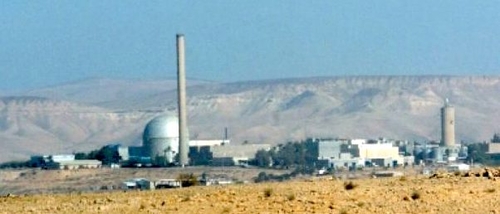As Arabs and Muslims warm to Israel, the Left grows colder. These shifts imply one great imperative for the Jewish state.
On the first shift: Israel's Prime Minister Benjamin Netanyahu recently pointed out "a great change" in the Arab world which has a growing connection to Israeli companies because it needs Israeli "technology and innovation, ... water, electricity, medical care, and high-tech." Explaining this normalization as a result of Arab states "looking for links with the strong," Netanyahu was too tactful of American liberals to add another factor: Barack Obama's policy of appeasing Tehran jolted the Arab states to get serious about the real threats facing them.
 Miri Regev, Israel's minister of culture and sports, cried as "Hatikvah" played in Abu Dhabi to celebrate judoka Sagi Muki's victory. |
Nor is it just Israeli companies making inroads into Arab countries. The Israeli minister of sports broke into tears as Hatikvah, Israel's anthem, was played in Abu Dhabi upon the victory of an Israeli athlete. Rumors are swirling about a handshake to come between Saudi Arabia's Crown Prince Mohammad bin Salman (MbS) and Israel's prime minister.
That Arab and Muslim enmity has fractured, probably never to be reconstituted, amounts to one tectonic shift in the Arab-Israeli conflict. The second, no less important, involves the global Left's growing hostility to Israel.
This pattern can be found consistently from South Korea to Thailand to South Africa to Sweden to Brazil. The Durban conference of 2001 initially brought this phenomenon to light. Among many other examples, the Black Lives Matter platform accuses Israel of "apartheid" and "genocide." A communist labor union in India representing 16 million farmers, apparently joined the boycott, divestment, and sanction (BDS) movement.
 An All India Kisan Sabha rally. Note the hammer and sickle. |
Attitudes toward the Jewish state follow an almost linear progression of growing negativity as one goes from right to left. A 2012 Pew Research Center survey of American adults found 75 percent of conservative Republicans sympathize more with Israel than with the Palestinians, followed by 60 percent of moderate and liberal Republicans, 47 percent of Independents, 46 percent of conservative and moderate Democrats, and 33 percent of liberal Democrats.
It was not always thus. Joseph Stalin was so instrumental to Israel's birth in 1947-49 by providing diplomatic support and armaments that Abba Eban, Israel's first UN ambassador, observed that "we couldn't have made it, either diplomatically or militarily," if not for Soviet help. Democrats Harry Truman and John F. Kennedy rank among the most pro-Israel of American presidents, but Republican Dwight Eisenhower was unquestionably the most antagonistic.
MbS versus Jeremy Corbyn symbolizes these two tectonic shifts, as does Israel now enjoying better relations with Egypt than with Sweden. The president of Chad turns up in Israel but a singer from New Zealand does not. Israel's athletes compete in the United Arab Emirates but get banned in Spain. Muslims show increasing indifference to the breakdown in Palestinian-Israeli diplomacy, but Leftists express growing anger over it.
This last point has great importance: the rage against Israel is not about Ashkenazi-Sephardi relations, tensions on the Temple Mount, a possible attack on Iran's nuclear infrastructure, or Israel's own nuclear weapons. Rather, it almost exclusively concerns the status of some 3 million Palestinians in the West Bank and Gaza. Thanks to a mix of Palestinian public relations expertise and continued antisemitism, the welfare of this small and powerless but fanatical population has transmogrified into the premier global issue of human rights, getting endlessly more attention than, say, Ethiopia – and motivates nearly all denunciations of Israel.
 The Shimon Peres Negev Nuclear Research Center at Dimona: not the source of Israel's public relations problems. |
Therefore, when the Left, now largely excluded from power, eventually returns to office in countries like Japan, India, Germany, France, the United Kingdom, and the United States, Israel will face a crisis due to the unresolved situations in the West Bank and Gaza.
Accordingly, a resolution of this issue should be an utmost priority for Israelis.
That does not mean touting yet another "peace plan" doomed to crash on the hard rock of Palestinian intransigence. It does mean, whatever one's favored plan might be, the need to end Palestinian aggression toward Israel: no more suicide attacks, kite bombings, and rockets. Only this will soothe Leftist rage.
Only an Israel victory and a Palestinian defeat will achieve this. In other words, getting the Palestinians to cry uncle is an urgent priority for Israel and its supporters.
Mr. Pipes (DanielPipes.org, @DanielPipes) is president of the Middle East Forum. © 2018 by Daniel Pipes. All rights reserved.

Aug. 19, 2020 update: Khaled Abu Toameh agrees:
The Palestinians are good at making enemies, and this time [a reference to the UAE-Israel joint statement of Aug. 13] it seems that they have been wildly successful in earning both the wrath and the disgust of a large number of Arabs. At this rate, the Palestinians will soon wake up to discover that they have more support in China and Europe than in their own backyard.
Sep. 10, 2020 update: Some examples from the Arabic-speaking countries:
Big changes afoot in the MidEast:
- Mecca's Grand Mosque preacher recalls Muhammad's good relations w/ Jews
— Daniel Pipes دانيال بايبس (@DanielPipes) September 10, 2020
- #ArabLeague turns down the PA's anti-Israel resolution
- And the UAE "advises" all hotels "to include Kosher food options" in all food offerings https://t.co/o8Hj2zYaOW pic.twitter.com/DyLur0wfEu
Sep. 16, 2020 update: Raphael Ahren writes in the Times of Israel a day after two peace treaties were signed at the White House that "Agreements indicate UAE and Bahrain are now less pro-Palestinian than Europe." Yes, but I'd put it differently: they indicate that the two are less anti-Israel than Europe.
Oct. 13, 2020 update: Salman el Herfi, the Palestinian Authority's "ambassador" in Paris, lashed out against the UAE and Bahraini leaders for their agreements a month ago with Israel. In the process, he neatly made my point about a tectonic shift:
The annexation [of parts of the West Bank] was halted by resistance from the Palestinian people and by international pressure. The European Union played a much more important role here than did the United Arab Emirates.
Oct. 23, 2020 update: Lev Stesin echoes this argument at "If Anything Sustains the Arab-Israeli Conflict, It Will Be Progressives' Antisemitism."
May 20, 2021 update: Looking at the current round of fighting between Hamas and Israel, Khaled Abu Toameh concludes that "While many in the West denounced Israel for its military strikes in the Gaza Strip over the past week, prominent Arab writers and political analysts held the Iranian-backed Hamas responsible for the violence and bloodshed."
